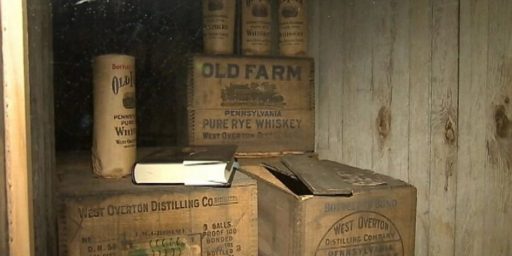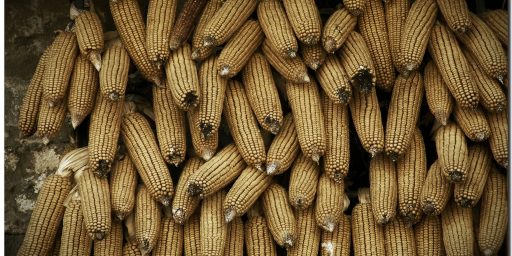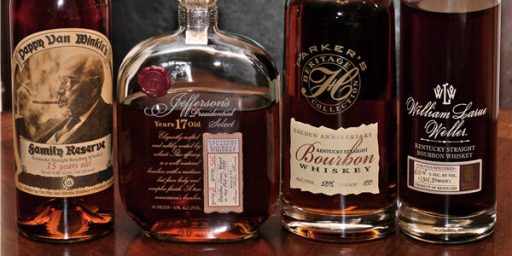IT’S THE CORN, STUPID
NYT has a fascinating piece on the history of corn. Sounds like a contradiction, doesn’t it? Well, according to the piece, overproduction of corn has been a consistent factor in bad health since the founding of the Republic:
It turns out that we have been here before, sort of, though the last great American binge involved not food, but alcohol. It came during the first decades of the 19th century, when Americans suddenly began drinking more than they ever had before or have since, going on a collective bender that confronted the young republic with its first major public-health crisis — the obesity epidemic of its day. Corn whiskey, suddenly superabundant and cheap, was the drink of choice, and in the 1820’s the typical American man was putting away half a pint of the stuff every day. That works out to more than five gallons of spirits a year for every American. The figure today is less than a gallon.
As W.J. Rorabaugh tells the story in ”The Alcoholic Republic,” we drank the hard stuff at breakfast, lunch and dinner, before work and after and very often during. Employers were expected to supply spirits over the course of the workday; in fact, the modern coffee break began as a late-morning whiskey break called ”the elevenses.” (Just to pronounce it makes you sound tipsy.) Except for a brief respite Sunday mornings in church, Americans simply did not gather — whether for a barn raising or quilting bee, corn husking or political campaign — without passing the jug. Visitors from Europe — hardly models of sobriety themselves — marveled at the free flow of American spirits. ”Come on then, if you love toping,” the journalist William Cobbett wrote his fellow Englishmen in a dispatch from America. ”For here you may drink yourself blind at the price of sixpence.”
The results of all this toping were entirely predictable: a rising tide of public drunkenness, violence and family abandonment and a spike in alcohol-related diseases. Several of the founding fathers — including George Washington, Thomas Jefferson and John Adams — denounced the excesses of the ”alcoholic republic,” inaugurating the American quarrel over drinking that would culminate a century later in Prohibition.
But the outcome of our national drinking binge is not nearly as relevant to our present predicament as its underlying cause. Which, put simply, was this: American farmers were producing way too much corn, especially in the newly settled areas west of the Appalachians, where fertile soil yielded one bumper crop after another. Much as it has today, the astounding productivity of American farmers proved to be their own worst enemy, as well as a threat to the public health. For when yields rise, the market is flooded with grain, and its price collapses. As a result, there is a surfeit of cheap calories that clever marketers sooner or later will figure out a way to induce us to consume.
In those days, the easiest thing to do with all that grain was to distill it. The Appalachian range made it difficult and expensive to transport surplus corn from the lightly settled Ohio River Valley to the more populous markets of the East, so farmers turned their corn into whiskey — a more compact and portable ”value-added commodity.” In time, the price of whiskey plummeted, to the point that people could afford to drink it by the pint, which is precisely what they did.
Nowadays, for somewhat different reasons, corn (along with most other agricultural commodities) is again abundant and cheap, and once again the easiest thing to do with the surplus is to turn it into more compact and portable value-added commodities: corn sweeteners, cornfed meat and chicken and highly processed foods of every description. The Alcoholic Republic has given way to the Republic of Fat, but in both cases, before the clever marketing, before the change in lifestyle, stands a veritable mountain of cheap grain. Until we somehow deal with this surfeit of calories coming off the farm, it is unlikely that even the most well-intentioned food companies or public-health campaigns will have much success changing the way we eat.
The underlying problem is agricultural overproduction, and that problem (while it understandably never receives quite as much attention as underproduction) is almost as old as agriculture itself. Even in the Old Testament, there’s talk about how to deal not only with the lean times but also with the fat: the Bible advises creation of a grain reserve to smooth out the swings of the market in food. The nature of farming has always made it difficult to synchronize supply and demand. For one thing, there are the vagaries of nature: farmers may decide how many acres they will plant, but precisely how much food they produce in any year is beyond their control.
The rules of classical economics just don’t seem to operate very well on the farm. When prices fall, for example, it would make sense for farmers to cut back on production, shrinking the supply of food to drive up its price. But in reality, farmers do precisely the opposite, planting and harvesting more food to keep their total income from falling, a practice that of course depresses prices even further. What’s rational for the individual farmer is disastrous for farmers as a group. Add to this logic the constant stream of improvements in agricultural technology (mechanization, hybrid seed, agrochemicals and now genetically modified crops — innovations all eagerly seized on by farmers hoping to stay one step ahead of falling prices by boosting yield), and you have a sure-fire recipe for overproduction — another word for way too much food.






”Come on then, if you love toping,” the journalist William Cobbett wrote his fellow Englishmen in a dispatch from America. ”For here you may drink yourself blind at the price of sixpence.”
Give me your poor, your tired, your befuddled masses yearning to drink free …
I’ll drink to that
Thanks James.. That was a cool article.
But it makes Lou Dobbs look like a complete moron. Yesterday he was on CNN hyping a story that I guess he ran today about the upcoming crisis in America.
In 10 years, he warned in dire tones, American farmers will only be able to produce enough food to feed our expanding population we will have none to export. After 10 years we won’t even be able to feed ourselves.
Of course that makes sense of you assume population is dynamic but farm production static. Surely the excess corn of the 18th century could not feed today’s population… Markets have a “funny” way of working… If there is not enough corn begin grown, more people will become farmers.
Imagine that.
Paul
It amazed me someone of Dobb’s stature running that story. Certainly he is smarter than that.
It’s rather amazing that most people don’t realize that the Women’s Christian Temperance Movement was, in fact, primarily concerned with spousal abuse and child neglect, which they linked to overconsumption of alcohol. By the way, they weren’t wrong, so far as we can tell–the correlation between alcohol abuse and domestic abuse and neglect are still quite strong today. Correlation is not causation, but it’s hard to prove causation in social science.
By the way, there was also a long time when “temperance” simply meant “drinking lightly, and avoiding distilled spirits.” For some, beer was considered the drink of moderation and temperence, although some were harder about it and wanted it eliminated.
By the way, here is an article that makes a fascinating companion piece to the NYT article you linked: Beer and America from the American Heritage.
i am a stupid korn lover can u help me i try to kill my self if i cant get corn